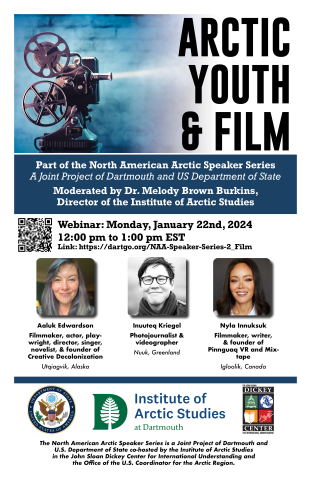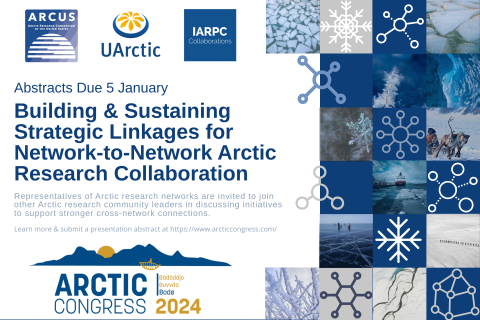Online, 12:00 p.m.–1:00 p.m. EST
The North American Arctic (NAA) - the region spanning Alaska, the Yukon, the Northwest Territories, Nunavut, and Greenland - is increasingly recognized for its distinct landscapes, strong historic and cultural connections between communities and peoples, and rising opportunities for knowledge sharing.
This NAA Speaker Series, jointly hosted by the Institute of Arctic Studies in the John Sloan Dickey Center for International Understanding at Dartmouth and the Arctic Office of the US Department of State, hopes to serve as a platform for advancing NAA knowledge sharing, networking, and collaborations.
Our second NAA Speaker Series event will be centered around Arctic youth and film, specifically about successes and challenges of engaging Arctic youth to advance Arctic and global knowledge sharing through film, storytelling, and documentaries that respect Indigenous knowledge and the centering of Arctic histories, cultures, and voices of the region’s next generation leaders.
Speakers:
Aaluk Edwardson, born and raised on the shores of the Arctic Ocean, is a multidisciplinary artist, purposeful educator and the founder and director of Creative Decolonization, LLC. Aaluk's work is focused on supporting wellness, cultural exploration and creative engagement in service to communities and families around the world. She has written poetry for adolescents healing from sexual abuse, culturally diverse plays for children and adults, and for TV. She is working on a novel and two children's storybooks at present. She's taught elementary, middle and high school students and has taught creative writing and Inuit history for the Iñupiaq Studies department at Iḷisaġvik College. Aaluk founded Creative Decolonization, LLC as a collaborative space to build community-driven creative projects that support cultural and individual wellness. The ATTA Project, the PUIGUITKAAT Project, the Evolving through Disaster Series, and the Sovereignty Stories Project are a few of the projects she's helped to develop in service to culture and community. Aaluk hopes this work encourages people to treat one another with respect and kindness with the eventual goal of a world full of such things. Learn more about Aaluk and her work at www.creativedecolonization.org and on the Creative Decolonization Podcast.
Inuuteq Kriegel was born in Aasiaat in northern Greenland and raised in Nuuk. Receiving his first camera at age 17, Inuuteq studied journalism at the University of Greenland, taking a semester to focus on international photojournalism. Since then, Inuuteq has exhibited his photography in six different countries and taken part in book releases. In 2013 he created a black and white portrait series of people from Greenland titled Thirteen (13) with Filip Gielda. In 2014 he was one of six Greenlandic photographers published in the book ”ISIT TAKUNNITTUT / ØJNENE DER SER” (ed. Iben Mondrup). He then worked with Bobbi Lo Produktion in 2019 and 2020 as a photographer and a videographer for “Noget lidt anderledes”. Inuuteq continues to take on creative photojournalism projects in Greenland and beyond.
Nyla Innuksuk is a filmmaker, producer and comic book writer based out of Toronto, Canada. Nyla co-created the teenage superhero Snowguard, a member of Marvel’s Champions League with her friend Jim Zub. Innuksuk’s first feature slash/back is a sci-fi adventure about a group of 14-year old girls from a remote Arctic community who take on an alien invasion. The film premiered at SXSW in March, 2022. Trapped, a short horror film shot specifically for a 24K resolution, 7 foot high, 270 degree screen, premiered at the 2022 Venice Biennale. Innuksuk is currently developing a second feature with her writing partner Ryan Cavan, set to film in 2024.
Originally from Igloolik, NU, Innuksuk studied film at Ryerson University before working as a producer at the Aboriginally owned and operated Big Soul Productions. She then went on to co-found Pinnguaq VR before establishing her own company Mixtape. In addition to her film and digital work, Nyla sits on the board of directors of Ontario Creates (formerly the OMDC) and the Glenn Gould Foundation. She is an ambassador for the Northern Indigenous Film Fund in Norway and was the 2018 imagineNATIVE artist in residence.


